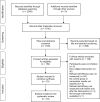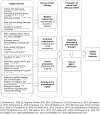Systematic review of digital interventions to support refusal self-efficacy in child and adolescent health promotion
- PMID: 36166268
- PMCID: PMC10243864
- DOI: 10.1093/heapro/daac085
Systematic review of digital interventions to support refusal self-efficacy in child and adolescent health promotion
Abstract
Refusal self-efficacy protects against risky health behavior. Digital interventions have the potential to support self-efficacy due to the enactive experience provided by digital technologies. The aim of this systematic literature review was to evaluate the evidence of digital interventions to support refusal self-efficacy in child and adolescent health promotion. Following the Cochrane Collaboration guidelines, five electronic databases were searched from 2009 to 2020. The studies were assessed by two independent reviewers according to the eligibility criteria. Eligible studies were included in the review, assessed for risk of bias, synthesized narratively and assessed for evidence quality with the GRADE approach. Twenty-three studies, that examined 18 different interventions, were included in the review. The interventions included various digital elements as means to support the child and adolescent refusal self-efficacy (e.g. games, videos, feedback and activities for regulating feelings). The interventions improving refusal self-efficacy were more often used at home setting and addressed the four sources of self-efficacy with different digital elements regardless of intervention duration and intensity. Although the results on intervention effects varied and the evidence quality remained low, the overall evidence concerning these interventions was encouraging. Based on the subgroup analysis, the results were mainly encouraging among girls. When these interventions are implemented in health promotion, their benefits and weaknesses need to be considered comprehensively. The results provide information for designing and developing digital interventions to support child and adolescent refusal self-efficacy. Further research with larger sample sizes and more rigorous study designs is needed to strengthen the evidence of these interventions.
Keywords: adolescent; child; digital health intervention; health behavior; health promotion; self-efficacy; systematic review.
Plain language summary
Refusal self-efficacy determines children’s and adolescents’ health behavior, for example when they are being offered cigarettes or alcohol and they face the challenge of refusing it. Since digital interventions are potential tools to support refusal self-efficacy, this review examined digital interventions to support refusal self-efficacy in child and adolescent health promotion. Twenty-three studies that examined such interventions were found. Most of the interventions that improved child and adolescent refusal self-efficacy were used in home settings and addressed all sources of self-efficacy regardless of intervention duration. Although the results varied, the interventions in general seemed to improve refusal self-efficacy, especially among girls. However, this study suggests that more high-quality research with more study participants is still needed to make stronger conclusions. Also, the benefits and weaknesses of digital interventions to support refusal self-efficacy need to be considered comprehensively before using them in child and adolescent health promotion.
© The Author(s) 2022. Published by Oxford University Press. All rights reserved. For permissions, please email: journals.permissions@oup.com.
Conflict of interest statement
The authors declare no conflict of interest.
Figures
References
-
- Anderson, M. and Jiang, J. (2018) Teens, Social Media & Technology 2018. Pew Research Center. https://www.pewinternet.org/wp-content/uploads/sites/9/2018/05/PI_2018.0... (last accessed 4 February 2021)
-
- Bandura, A. (1977) Self-efficacy: toward a unifying theory of behavioral change. Psychological Review, 84, 191–215. - PubMed
-
- Bandura, A. (1997) Self-Efficacy: The Exercise of Control. W.H. Freeman and Company, New York, NY.
-
- Bandura, A. (2006) Guide for constructing self-efficacy scales. In Urdan, T. and Pajares, F. (eds), Self-Efficacy Beliefs of Adolescents. Information Age Publishing, Greenwich, CT.
Publication types
MeSH terms
LinkOut - more resources
Full Text Sources
Medical



